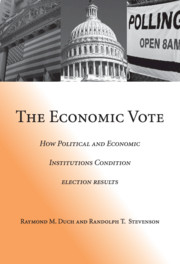Book contents
- Frontmatter
- Contents
- Preface
- 1 Introduction
- Part I Describing the Economic Vote in Western Democracies
- Part II A Contextual Theory of Rational Retrospective Economic Voting: Competency Signals
- Part III A Contextual Theory of Rational Retrospective Economic Voting: Strategic Voting
- Part IV Conclusion and Summary
- Appendix A
- Appendix B
- Appendix C
- References
- Index
- Cambridge Cultural Social Studies
Preface
Published online by Cambridge University Press: 06 July 2010
- Frontmatter
- Contents
- Preface
- 1 Introduction
- Part I Describing the Economic Vote in Western Democracies
- Part II A Contextual Theory of Rational Retrospective Economic Voting: Competency Signals
- Part III A Contextual Theory of Rational Retrospective Economic Voting: Strategic Voting
- Part IV Conclusion and Summary
- Appendix A
- Appendix B
- Appendix C
- References
- Index
- Cambridge Cultural Social Studies
Summary
As our friends, families, and colleagues will attest – and bemoan – this book has taken almost eight years to complete. The ultimate product has little in common with the initial idea that we intended to explore, which was examining the extent to which the impact of the “real” economy on political behavior is mediated by its representation in the electronic and print media. We got side-tracked with the question of whether there was, in fact, an economic vote and whether it varied across contexts in any significant fashion. And then we decided we needed to come up with a theory to explain this contextual variation.
Our treatment of the economic vote in this book is a significant departure from much of the comparative economic voting literature. One of its novel aspects is that it takes seriously the importance of writing down a rigorous theoretical model of the vote decision and of precisely how context conditions the importance of economic evaluations in the voter's preference function.
We hope our readers will appreciate that this has been an ambitious project both in our effort at developing a theory of the economic vote and in our determination to assemble and analyze the appropriate data for testing these theoretical hypotheses. We could not have accomplished these tasks without generous support from a number of funding institutions and academic institutions. Most importantly, we benefited from a National Science Foundation grant (#SBR-0215633) that enabled us to undertake the ambitious data collection and analysis.
- Type
- Chapter
- Information
- The Economic VoteHow Political and Economic Institutions Condition Election Results, pp. xi - xivPublisher: Cambridge University PressPrint publication year: 2008

